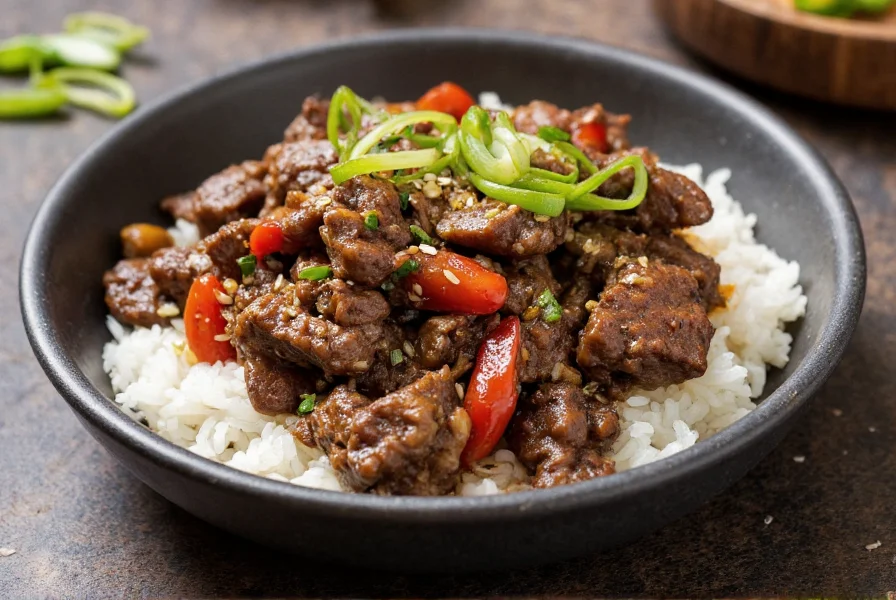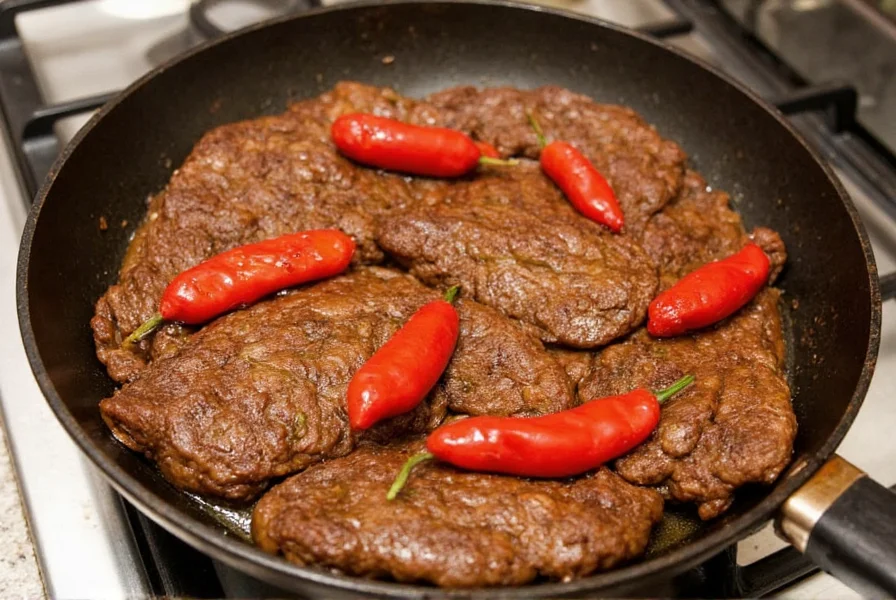The quickest way to cook delicious pepper steak: Slice 1 lb sirloin steak against the grain, marinate in 2 tbsp soy sauce and 1 tsp cornstarch for 15 minutes. Stir-fry steak in hot oil for 2-3 minutes until browned, remove. Sauté 1 sliced bell pepper and 1 sliced onion for 3-4 minutes. Return steak to pan, add sauce (3 tbsp soy sauce, 2 tbsp oyster sauce, 1 tbsp brown sugar, 1 tsp sesame oil, 1/4 cup broth), and cook 2 minutes until glossy and thickened. Serve immediately over rice.
Perfect Pepper Steak Recipe for Weeknight Dinners
Pepper steak is a beloved Chinese-American classic that combines tender slices of beef with vibrant bell peppers in a savory, slightly sweet sauce. This easy pepper steak recipe delivers restaurant-quality results in under 30 minutes using simple ingredients you likely already have in your pantry. Whether you're cooking for family dinner or meal prepping for the week, this versatile dish satisfies with minimal effort and maximum flavor.
Why This Pepper Steak Recipe Works
Unlike many simplified versions that compromise on flavor, this authentic pepper steak method incorporates professional techniques that ensure tender meat and perfectly balanced sauce. The key is in the velveting process - a Chinese cooking technique that protects the steak during high-heat cooking. By marinating the meat with cornstarch and soy sauce before stir-frying, you create a protective barrier that locks in juices while allowing quick searing without overcooking.

Essential Ingredients for Authentic Pepper Steak
Quality ingredients make the difference between ordinary and exceptional pepper steak. Here's what you'll need:
| Ingredient | Amount | Why It Matters |
|---|---|---|
| Sirloin or flank steak | 1 lb (450g) | Lean cut that slices well and cooks quickly without becoming tough |
| Bell peppers (mixed colors) | 2 large, sliced | Provides sweetness and crunch; red peppers add natural sugar |
| Yellow onion | 1 medium, sliced | Adds depth of flavor without overpowering |
| Soy sauce | 5 tbsp total | Base for umami flavor; use reduced-sodium for better control |
| Oyster sauce | 2 tbsp | Essential for authentic restaurant-style flavor |
| Cornstarch | 2 tsp | Velvets meat and thickens sauce without lumps |
Equipment You'll Need
While you can make pepper steak in a regular skillet, these tools help achieve authentic results:
- Carbon steel wok or heavy-bottomed skillet (for proper heat retention)
- Sharp chef's knife (for precise slicing against the grain)
- Mandoline slicer (optional, for perfectly uniform pepper slices)
- Wooden spoon or wok spatula (won't scratch your cooking surface)
Step-by-Step Cooking Instructions
Preparation (10 minutes)
- Place steak in freezer for 15-20 minutes to firm up for easier slicing
- Cut steak against the grain into 1/4-inch thick slices (this tenderizes naturally)
- Mix marinade: 2 tbsp soy sauce, 1 tsp cornstarch, 1 tsp rice wine (or dry sherry)
- Add steak to marinade, coat thoroughly, and let sit 15 minutes
- Prepare sauce: 3 tbsp soy sauce, 2 tbsp oyster sauce, 1 tbsp brown sugar, 1 tsp sesame oil, 1/4 cup beef broth, 1 tsp cornstarch
- Slice bell peppers and onion into uniform 1/4-inch strips
Cooking Process (12 minutes)
- Heat 2 tbsp oil in wok over high heat until shimmering (about 400°F/200°C)
- Add steak in single layer, cook 1-2 minutes per side until browned but not cooked through
- Remove steak immediately to prevent overcooking
- Add 1 tbsp oil, stir-fry peppers and onions 3-4 minutes until crisp-tender
- Return steak to wok, pour sauce over ingredients
- Cook 2-3 minutes, stirring constantly, until sauce thickens and coats ingredients
- Remove from heat; stir in 1 tsp sesame oil for aroma

Timing Guide for Perfect Pepper Steak
Timing is crucial for stir-frying. Follow this schedule for best results:
- Prep time: 10 minutes (including marinating)
- Cooking time: 12 minutes (don't walk away - stir-frying happens fast!)
- Total time: 22 minutes
- Resting time: None needed - serve immediately
Common Mistakes to Avoid
Even experienced cooks make these pepper steak errors:
- Overcrowding the pan: Cook steak in batches if necessary - too much meat lowers temperature and causes steaming instead of searing
- Slicing with the grain: Always cut across the grain for tender results
- Using cold ingredients: Bring meat and vegetables to room temperature before cooking
- Overcooking the sauce: Remove from heat as soon as it thickens to prevent burning
- Skipping the velveting step: The cornstarch marinade makes a dramatic difference in texture
Serving Suggestions
Pepper steak shines when served properly:
- Pair with steamed jasmine rice or cauliflower rice for low-carb option
- Garnish with sliced green onions and sesame seeds
- Serve immediately while hot and sizzling
- Complement with a simple side like bok choy or cucumber salad
- For extra heat, add sliced fresh chili peppers during cooking
Popular Variations
Customize this easy pepper steak recipe to suit your preferences:
- Spicy version: Add 1 tbsp chili garlic sauce to the sauce mixture
- Vegetarian option: Substitute beef with extra-firm tofu or seitan
- Gluten-free: Use tamari instead of soy sauce and ensure oyster sauce is GF
- Extra tender: Add 1/2 tsp baking soda to marinade for professional-level tenderness
- Weeknight shortcut: Use pre-sliced steak from the grocery store (though quality may vary)
Storage and Reheating Tips
While pepper steak is best fresh, leftovers can be stored properly:
- Cool completely before storing in airtight container
- Refrigerate for up to 3 days
- Freeze for up to 2 months (sauce may separate slightly when thawed)
- Reheat gently in skillet with 1-2 tsp water to restore moisture
- Avoid microwaving which can make meat tough and peppers mushy
What's the best cut of meat for pepper steak?
Sirloin and flank steak are ideal for pepper steak. Sirloin offers good marbling with reasonable price, while flank steak provides excellent beefy flavor. Both slice well and respond beautifully to the velveting technique. For premium results, consider ribeye sliced very thin, though it's more expensive and has more fat to manage during cooking.
How can I make my pepper steak sauce thicker without lumps?
The secret to lump-free thickening is the cornstarch slurry method. Mix cornstarch with cold liquid (broth or water) before adding to hot sauce. For pepper steak, we recommend mixing 1 teaspoon cornstarch with 2 tablespoons cold broth before adding to your sauce ingredients. This prevents clumping and creates a smooth, glossy finish that properly coats the ingredients.
Why is my pepper steak tough even though I followed the recipe?
Tough pepper steak usually results from one of three issues: slicing with the grain instead of against it, overcooking the meat, or skipping the velveting step. Always cut across the muscle fibers, remove steak from heat when 80% done (it will continue cooking), and never skip the cornstarch marinade. If using a less tender cut like round steak, consider adding 1/2 teaspoon baking soda to the marinade for extra tenderizing.
Can I make pepper steak without a wok?
Yes, you can make excellent pepper steak without a wok. Use the heaviest skillet you have (cast iron works well) and ensure it's properly preheated. The key is maintaining high heat throughout cooking. You may need to work in slightly smaller batches to prevent temperature drop, and you'll need to stir more frequently to prevent sticking. While a wok's shape distributes heat optimally, a good carbon steel or cast iron skillet can produce nearly identical results with proper technique.











 浙公网安备
33010002000092号
浙公网安备
33010002000092号 浙B2-20120091-4
浙B2-20120091-4